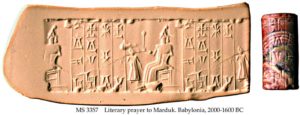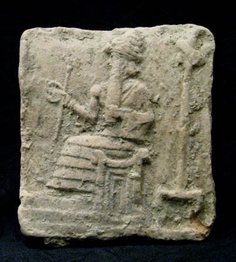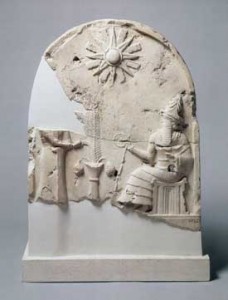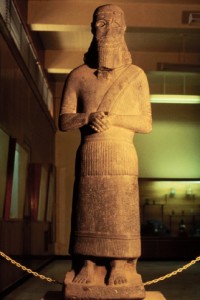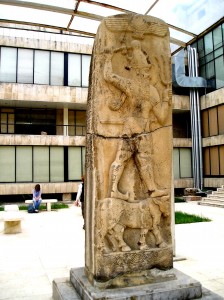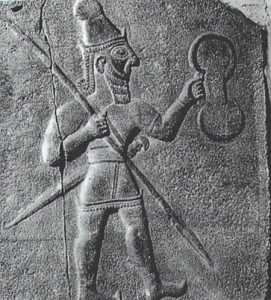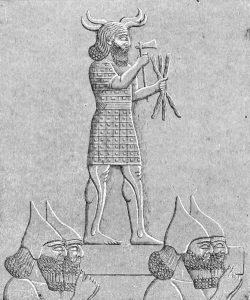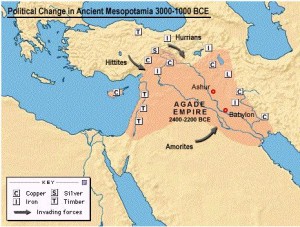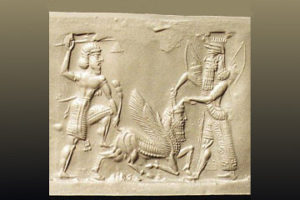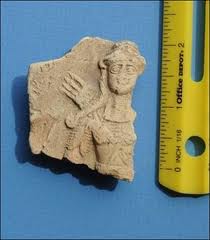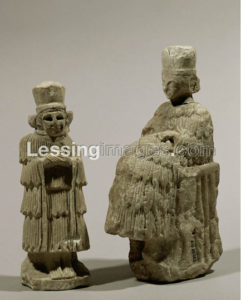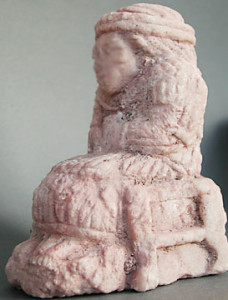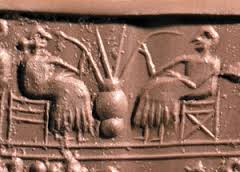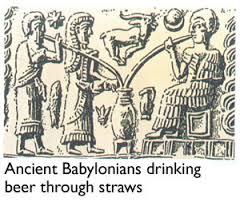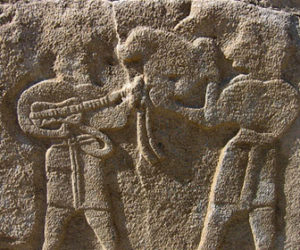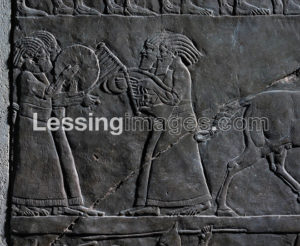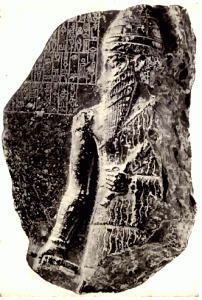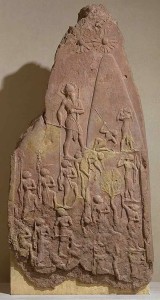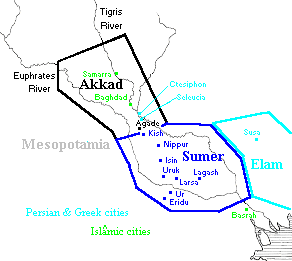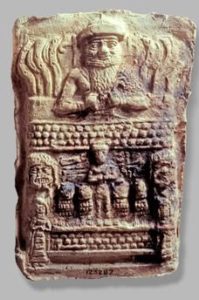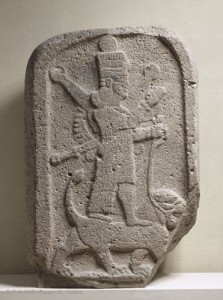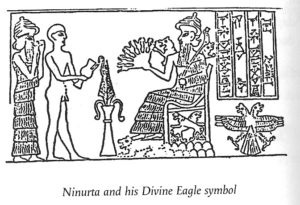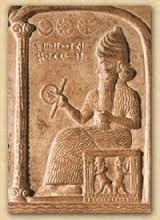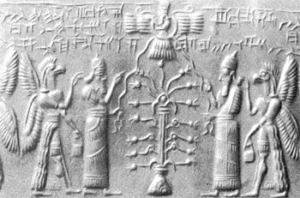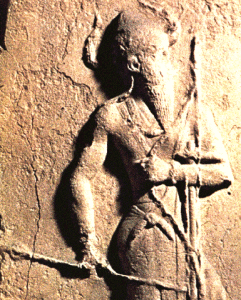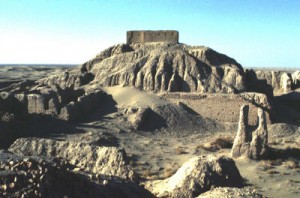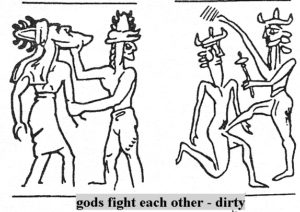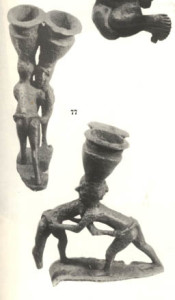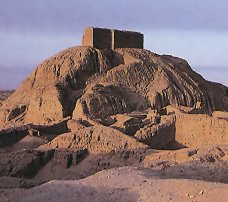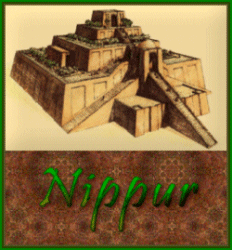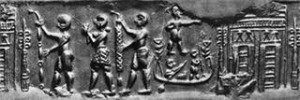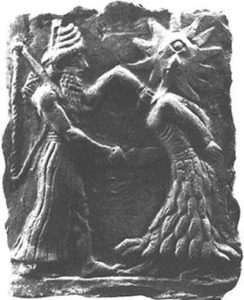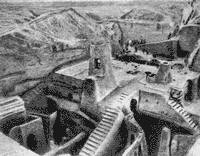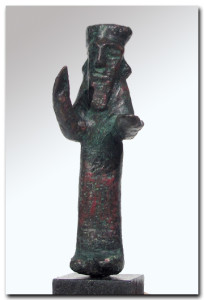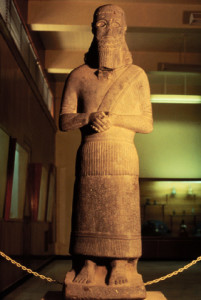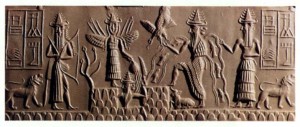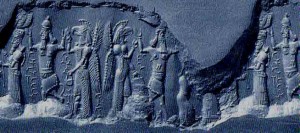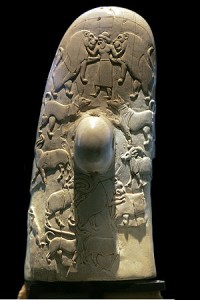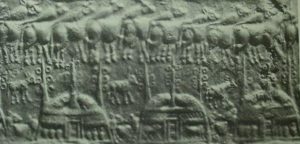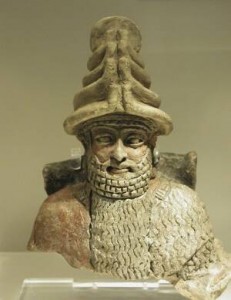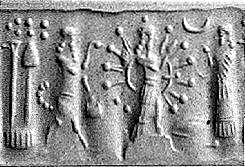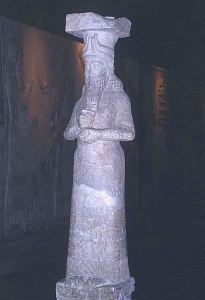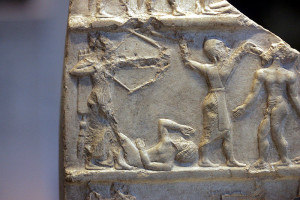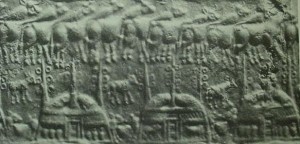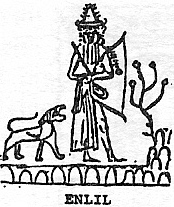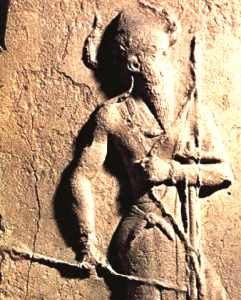The Electronic Text Corpus of Sumerian Literature
(Texts: All Artifacts, Color Coding, & Writings in Bold Type With Italics Inside Parenthesis, are Added by Editor R. Brown, not the Authors, Translators, or Publishers!)
(gods in blue …mixed-breed demigods in teal...)
Sumerian on clay, Babylonia, 2000-1800 BC, 1 tablet, 8,1×6,5×2,7 cm, single column, 26 lines in cuneiform script.
(In the following translation, mss. are referred to by the sigla used by Vincente 1995; from those listed there, mss. Fi, Go, P6, and WB 62 were not used; if not specified by a note, numerical data come from ms. WB.)
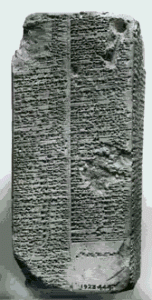
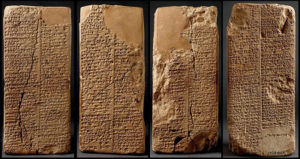
(Sumerian Kings List, original ancient list of Earth’s 1st kings, all mixed-breeds kings appointed by the gods)
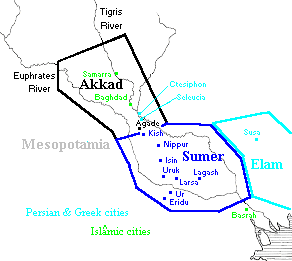 (land of the gods, the “Eden”, the land between the Rivers Euphrates & Tigris)
(land of the gods, the “Eden”, the land between the Rivers Euphrates & Tigris)
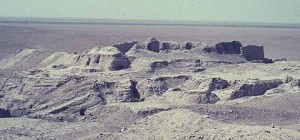 (Eridu ruins, Enki‘s patron city)
(Eridu ruins, Enki‘s patron city)
1-39 After the kingship descended from heaven, the kingship was in Eridug (Eridu).
In Eridug, Alulim (giant semi-divine descendant of the Anunnaki alien gods) became king; he ruled for 28,800 years.
Alaljar (bigger, stronger, faster, smarter, & lived much longer than non-mixed earthlings) ruled for 36,000 years.
2 kings; they ruled for 64,800 years.
Then Eridug fell and the kingship was taken to Bad-tibira.
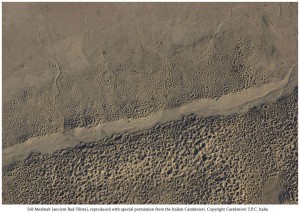 (aerial view of looted Bad-tibira ruins, Dumuzi‘s patron city)
(aerial view of looted Bad-tibira ruins, Dumuzi‘s patron city)
In Bad-tibira, En-men-lu-ana ruled for 43,200 years.
En-men-gal-ana ruled for 28,800 years.
Dumuzid the shepherd (Inanna‘s spouse), ruled for 36,000 years.
3 kings; they ruled for 108,000 years
Then Bad-tibira fell (?) and the kingship was taken to Larag.
In Larag (Larak), En-sipad-zid-ana ruled for 28,800 years.
1 king; he ruled for 28,800 years.
Then Larag fell (?) and the kingship was taken to Zimbir (Sippar).
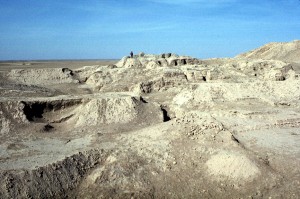 (Sippar ruins, Utu‘s patron city)
(Sippar ruins, Utu‘s patron city)
In Zimbir, En-men-dur-ana became king; he ruled for 21,000 years.
1 king; he ruled for 21,000 years.
Then Zimbir fell (?) and the kingship was taken to Curuppag (Shuruppak).
In Curuppag (Ninlil‘s patron city), Ubara-Tutu (Noah‘s father) became king; he ruled for 18,600 years.
1 king; he ruled for 18,600 years.
In 5 cities 8 kings; they ruled for 241,200 years.
Then the flood swept over.
 (Kish ruins, Ninhursag‘s patron city)
(Kish ruins, Ninhursag‘s patron city)
40-94 After the flood had swept over, and the kingship had descended from heaven, the kingship was in Kic.
In Kic, Jucur became king; he ruled for 1,200 years.
Kullassina-bel ruled for 960 (ms. P2+L2 has instead: 900) years.
Nanjiclicma ruled for (ms. P2+L2 has:) 670 (?) years.
En-tarah-ana ruled for (ms. P2+L2 has:) 420 years ……, 3 months, and 3 1/2 days.
Babum …… ruled for (ms. P2+L2 has:) 300 years.
Puannum ruled for 840 (ms. P2+L2 has instead: 240) years.
Kalibum ruled for 960 (ms. P2+L2 has instead: 900) years.
Kalumum ruled for 840 (mss. P3+BT14, Su1 has instead: 900) years.
Zuqaqip ruled for 900 (ms. Su1 has instead: 600) years.
(In mss. P2+L2, P3+BT14, P5, the 10th and 11th rulers of the dynasty precede the 8th and 9th.)
Atab (mss. P2+L2, P3+BT14, P5 have instead: Aba) ruled for 600 years.
Macda, the son of Atab, ruled for 840 (ms. Su1 has instead: 720) years.
Arwium, the son of Macda, ruled for 720 years.
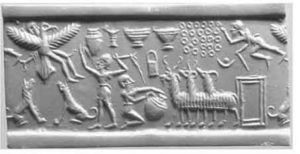
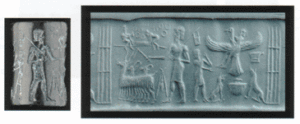
(Kish King Etana is lifted by eagle pilot off the Earth, headed for Heaven / planet Nibiru, to see god the father, Anu)
Etana, the shepherd, who ascended to heaven (planet Nibiru) and consolidated all the foreign countries, became king;
he ruled for 1,500 (ms. P2+L2 has instead: 635) years.
Balih, the son of Etana, ruled for 400 (mss. P2+L2, Su1 have instead: 410) years.
En-me-nuna ruled for 660 (ms. P2+L2 has instead: 621) years.
Melem-Kic, the son of En-me-nuna, ruled for 900 years.
(ms. P3+BT14 adds:) 1,560 are the years of the dynasty of En-me-nuna.
Barsal-nuna, the son of En-me-nuna, (mss. P5, P3+BT14 have instead: Barsal-nuna) ruled for 1,200 years.
Zamug, the son of Barsal-nuna, ruled for 140 years.
Tizqar, the son of Zamug, ruled for 305 years. (ms. P3+BT14 adds:) 1620 + X …
Ilku ruled for 900 years.
Iltasadum ruled for 1,200 years.
En-men-barage-si, who made the land of Elam submit, became king; he ruled for 900 years.
Aga, the son of En-men-barage-si, ruled for 625 years. (ms. P3+BT14 adds:)
1,525 are the years of the dynasty of En-men-barage-si.
23 kings; they ruled for 24,510 years, 3 months, and 3 1/2 days.
Then Kic was defeated and the kingship was taken to E-ana (Anu‘s temple residence in Uruk).
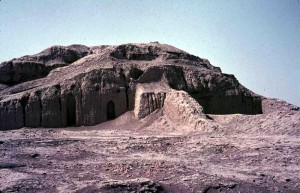 (E-ana in Uruk, ziggurat residence of Anu, Inanna, etc.)
(E-ana in Uruk, ziggurat residence of Anu, Inanna, etc.)
95-133 In E-ana, Mec-ki-aj-gacer, the (giant mixed-breed) son of Utu, became lord and king;
he ruled for 324 (ms. P2+L2 has instead: 325) years.
Mec-ki-aj-gacer (Meshkiagasher) entered the sea and disappeared.
Enmerkar, the son of Mec-ki-aj-gacer, the king of Unug (Uruk), who built Unug
(mss. L1+N1, P2+L2 have instead: under whom Unug was built), became king; he ruled for 420 (ms. TL has instead: 900 + X) years.
(ms. P3+BT14 adds:) 745 are the years of the dynasty of Mec-ki-aj-gacer. (ms TL adds instead: ……; he ruled for 5 + X years.)
Lugalbanda (Ninsun‘s semi-divine mixed-breed spouse), the shepherd, ruled for 1,200 years.
Dumuzid, the fisherman, (not Enki’s son) whose city was Kuara, ruled for 100 (ms. TL has instead: 110) years. (ms. P3+BT14 adds:)
He captured En-me-barage-si single-handed.
Gilgamec (Ninsun‘s son), whose father (Lugalbanda) was a phantom (?), the lord of Kulaba, ruled for 126 years.
Ur-Nungal, the son of Gilgamec (Gilgamesh), ruled for 30 years.
Udul-kalama, the son of Ur-Nungal (ms. Su1 has instead: Ur-lugal), ruled for 15 years.
La-ba’cum ruled for 9 years.
En-nun-tarah-ana ruled for 8 years.
Mec-he, the smith, ruled for 36 years.
Melem-ana (ms. Su2 has instead: Til-kug (?) ……) ruled for 6 (ms. Su2 has instead: 900) years.
Lugal-kitun (?) ruled for 3 (ms. Su2 has instead: 420) years.
12 kings; they ruled for 2,310 (ms. Su2 has instead: 3,588) years.
Then Unug (Uruk) was defeated and the kingship was taken to Urim (Ur).
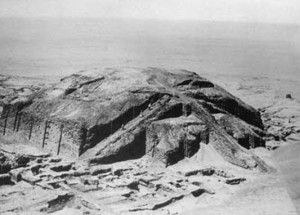 (Nannar‘s ziggurat residence in patron city of Ur)
(Nannar‘s ziggurat residence in patron city of Ur)
134-147 In Urim (Nannar‘s patron city), Mec-Ane-pada became king; he ruled for 80 years.
Mec-ki-aj-Nanna (ms. P2+L2 has instead: Mec-ki-aj-nuna), the son of Mec-Ane-pada, became king;
he ruled for 36 (ms. P2+L2 has instead: 30) years.
Elulu ruled for (mss. L1+N1, P2+L2, P3+BT14 have:) 25 years.
Balulu ruled for (mss. L1+N1, P2+L2, P3+BT14 have:) 36 years. (mss. L1+N1, P2+L2 have:)
4 kings; they ruled for (mss. L1+N1, P2+L2, P3+BT14 have:) 171 years.
Then Urim was defeated and the kingship was taken to Awan.
148-159 In Awan, …… became king; he ruled for …… years.
…… ruled for …… years.
…… ruled for 36 years.
3 kings; they ruled for 356 years.
Then Awan was defeated and the kingship was taken to Kic (Kish, Ninhursag‘s patron city).
160-178 In Kic, Susuda, the fuller, became king; he ruled for 201 + X years.
Dadasig ruled for (ms. vD has:) 81 years.
Mamagal, the boatman, ruled for 360 (ms. L1+N1 has instead: 420) years.
Kalbum, the son of Mamagal (ms. WB has instead: Magalgal), ruled for 195 (ms. L1+N1 has instead: 132) years.
Tuge (?) ruled for 360 years.
Men-nuna, (ms. L1+N1 adds:) the son of Tuge (?), ruled for 180 years.
(in mss. L1+N1, TL, the 7th and 8th rulers of the dynasty are in reverse order) …… ruled for 290 years.
Lugalju ruled for 360 (ms. L1+N1 has instead: 420) years.
8 kings; they ruled for 3195 (ms. L1+N1 has instead: 3792) years.
Then Kic was defeated and the kingship was taken to Hamazi.
179-185 In Hamazi, Hadanic became king; he ruled for 360 years.
1 king; he ruled for 360 years.
Then Hamazi was defeated and the kingship was taken (ms. P3+BT14 has instead: was returned a second time) to Unug (Uruk).
(In mss. IB, L1+N1, TL, the 2nd dynasty of Unug of ll. 185-191 is preceded by the 2nd dynasty of Urim of ll. 192-203.)
186-192 In Unug, En-cakanca-ana became king; he ruled for 60 years.
Lugal-ure (ms. P3+BT14 has instead: Lugal-kinice-dudu (?)) ruled for 120 years.
Argandea ruled for 7 years.
(ms. L1+N1 has:) 3 kings; they ruled for (ms. L1+N1 has:) 187 years.
Then Unug (Uruk) was defeated (ms. TL has instead:destroyed) and the kingship was taken to Urim (Ur).
193-204 In Urim, Nani became king; he ruled for (ms. vD has:) 120 + X (ms. IB has instead: 54 + X) years.
Mec-ki-aj-Nanna, the son of Nani, ruled for (ms. vD has:) 48 years.
……, the son (?) of ……, ruled for (ms. IB has:) 2 years.
(ms. IB has:) 3 kings; they ruled for (ms. IB has:) 582 (ms. TL has instead: 578) years.
(ms. vD has instead: 2 kings; they ruled for 120 + years.)
Then Urim was defeated (ms. TL has instead:destroyed) and the kingship was taken to Adab.
205-210 In Adab, Lugal-Ane-mundu became king; he ruled for (mss. L1+N1, TL have:) 90 years.
(mss. L1+N1, TL have:) 1 king; he ruled for (mss. L1+N1, TL have:) 90 years.
Then Adab was defeated (ms. TL has instead: destroyed) and the kingship was taken to Mari.
211-223 In Mari, Anbu (?) became king; he ruled for 30 (ms. TL has instead: 90) years.
Anba (?), the son of Anbu (?), ruled for 17 (ms. TL has instead: 7) years.
Bazi, the leatherworker, ruled for 30 years.
Zizi, the fuller, ruled for 20 years.
Limer, the gudu priest, ruled for 30 years.
Carrum-iter ruled for 9 (ms. TL has instead: 7) years.
6 kings; they ruled for 136 (ms. TL has instead: 184) years.
Then Mari was defeated (ms. TL has instead: destroyed) and the kingship was taken to Kic (Kish).
224-231 In Kic, Kug-Bau, the woman tavern-keeper, who made firm the foundations of Kic,
became king; she ruled for 100 years. (1st female as King)
1 king; she ruled for 100 years.
Then Kic was defeated (ms. TL has instead:destroyed) and the kingship was taken to Akcak (Akkad / Agade, Adad‘s domain).
232-243 In Akcak, Unzi became king; he ruled for 30 years.
Undalulu ruled for 6 (mss. L1+N1, S have instead: 12) years.
Urur ruled for (ms. IB has instead: was king (?) for) 6 years.
Puzur-Nirah ruled for (mss. IB, L1+N1, S, Su1 have:) 20 years.
Icu-Il ruled for (mss. IB, L1+N1, S, Su1 have:) 24 years.
Cu-Suen, the son of Icu-Il, ruled for (mss. IB, L1+N1, S, TL have:) 7 (ms. Su1 has instead: 24) years.(mss. S, Su1, TL have:)
6 kings; they ruled for (mss. L1+N1, S, TL have:) 99 (ms. Su1 has instead: 116) years
(ms. IB has instead: 5 kings; they ruled for (ms. IB has:) 87 years).
Then Akcak was defeated (ms. S has instead: Then the reign of Akcak was abolished)
and the kingship was taken to Kic (Kish).
(mss. IB, S, Su1, Su3+Su4 list the 3rd and 4th dynasty of Kic of ll. 224-231 and ll. 244-258, respectively, as one dynasty)
244-258 In Kic, Puzur-Suen, the son of Kug-Bau, became king; he ruled for 25 years.
Ur-Zababa, the son of Puzur-Suen, ruled for 400 (mss. P3+BT14, S have instead: 6) (ms. IB has instead: 4 + X) years.
(ms. P3+BT14 adds:) 131 are the years of the dynasty of Kug-Bau.
Zimudar (ms. TL has instead: Ziju-iake) ruled for 30 (ms. IB has instead: 30 + X) years.
Uß³i-watar, the son of Zimudar (ms. TL has instead: Ziju-iake), ruled for 7 (ms. S has instead: 6) years.
Ectar-mut ruled for 11 (ms. Su1 has instead: 17 (?)) years.
Icme-Camac ruled for 11 years. (ms. Su1 adds:) Cu-ilicu ruled for 15 years.
Nanniya, the jeweller, (ms. Su1 has instead: Zimudar) (ms. IB has instead: ……) ruled for 7 (ms. S has instead: 3) years.
7 kings; they ruled for 491 (ms. Su1 has instead: 485) years (ms. S has instead: 8 kings; they ruled for (ms. S has:) 586 years).
Then Kic was defeated (ms. S has instead: Then the reign of Kic (Kish) was abolished)
and the kingship was taken (ms. P3+BT14 has instead: was returned a third time) to Unug (Uruk).
(ms. IB omits the 3rd dynasty of Unug of ll. 258-263)
259-265 In Unug, Lugal-zage-si became king; he ruled for 25 (ms. P3+BT14 has instead: 34) years.
1 king; he ruled for 25 (ms. P3+BT14 has instead: 34) years.
Then Unug was defeated (ms. S has instead:
Then the reign of Unug was abolished) and the kingship was taken to Agade (Akkad).
266-296 In Agade, Sargon, whose father was a gardener, the cupbearer of Ur-Zababa, became king,
the king of Agade, who built Agade (ms. L1+N1 has instead: under whom Agade was built);
he ruled for 56 (ms. L1+N1 has instead: 55) (ms. TL has instead: 54) years.
Rimuc, the son of Sargon, ruled for 9 (ms. IB has instead: 7) (ms. L1+N1 has instead: 15) years.
Man-icticcu, the older brother of Rimuc, the son of Sargon, ruled for 15 (ms. L1+N1 has instead: 7) years.
Naram-Suen, the son of Man-icticcu, ruled for (mss. L1+N1, P3+BT14 have:) 56 years.
Car-kali-carri, the son of Naram-Suen, ruled for (ms. L1+N1, Su+Su4 have:) 25 (ms. P3+BT14 has instead: 24) years.
(ms. P3+BT14 adds:) 157 are the years of the dynasty of Sargon.
Then who was king? Who was the king? (ms. Su3+Su4 has instead: who was king? Who indeed was king?)
Irgigi was king, Imi was king, Nanûm was king (in mss. L1+N1, Su3+Su4, Imi and Nanûm are in reverse order) ,
Ilulu was king, and the (mss. P3+BT14, S have:) 4 of them ruled for only (mss. P3+BT14, S have:) 3 years.
Dudu ruled for 21 years.
Cu-Durul, the son of Dudu, ruled for 15 (ms. IB has instead: 18) years.
11 kings; they ruled for 181 years (ms. S has instead: 12 kings; they ruled for (ms. S has:) 197 years)
(mss. Su1, Su3+Su4, which omit Dudu and Cu-Durul, have instead: 9 kings; they ruled for (ms. Su1 has:) 161 (ms. Su3+Su4 has instead: 177) years.
Then Agade was defeated (ms. S has instead:
Then the reign of Agade (Akkad) was abolished) and the kingship was taken to Unug (Uruk).
297-307 In Unug, Ur-nijin became king; he ruled for 7 (mss. IB, S have instead: 3)
(ms. Su1 has instead:15) (ms. Su3+Su4 has instead: 30) years.
Ur-gigir, the son of Ur-nijin, ruled for 6 (ms. IB has instead: 7) (ms. Su1 has instead: 15) (ms. Su3+Su4 has instead: 7) years.
Kuda ruled for 6 years.
Puzur-ili ruled for 5 (ms. IB has instead: 20) years.
Ur-Utu ruled for 6 (ms. Su3+Su4 has instead: Ur-Utu),
the son of Ur-gigir, ruled for 25 (ms. Su1 has instead: Lugal-melem, the son of Ur-gigir, ruled for 7) years.
5 kings; they ruled for 30 (ms. IB has instead: 43) (mss. PÝ+Ha, S have instead: 26) years
(ms. Su3+Su4, which omits Kuda and Puzur-ili, has instead: 3 kings; they ruled for (ms. Su3+Su4 has:) 47 years).
Unug was defeated (ms. S has instead:
Then the reign of Unug (Uruk) was abolished) and the kingship was taken to the army (ms. Su3+Su4 has instead: land) of Gutium.
308-334 In the army (ms. Su3+Su4 has instead: land) of Gutium, at first no king was famous;
they were their own kings and ruled thus for 3 years
(ms. L1+N1 has instead: they had no king; they ruled themselves for 5 years).
Then Inkicuc (ms. Su3+Su4 has instead: ……) ruled for 6 (ms. L1+Ni1 has instead: 7) years.
Zarlagab ruled for 6 years.
Culme (ms. L1+N1 has instead: Yarlagac) ruled for 6 years.
Silulumec (ms. Mi has instead: Silulu) ruled for 6 (ms. G has instead: 7) years.
Inimabakec ruled for 5 (ms. Mi has instead: Duga ruled for 6) years.
Igecauc ruled for 6 (ms. Mi has instead: Ilu-an (?) ruled for 3) years.
Yarlagab ruled for 15 (ms. Mi has instead: 5) years. Ibate ruled for 3 years.
Yarla (ms. L1+N1 has instead: Yarlangab (?)) ruled for 3 years.
Kurum (ms. L1+N1 has instead: ……) ruled for 1 (ms. Mi has instead: 3) years.
Apil-kin ruled for 3 years.
La-erabum (?) ruled for 2 years.
Irarum ruled for 2 years.
Ibranum ruled for 1 year.
Hablum ruled for 2 years.
Puzur-Suen, the son of Hablum, ruled for 7 years.
Yarlaganda ruled for 7 years.
…… ruled for 7 years.
Tiriga (?) ruled for 40 days.
21 kings; they ruled for (ms. L1+N1 has:) 124 years and 40 days (ms. Su3+Su4 has instead: 25 years).
Then the army of Gutium was defeated (ms. TL has instead: destroyed) and the kingship was taken to Unug (Uruk).
335-340 In Unug, Utu-hejal became king; he ruled for 427 years, …… days
(ms. IB has instead: 26 years, 2 + X months, and 15 days)
(ms. J has instead: 7 years, 6 months, and 15 days) (ms. TL has instead: 7 years, 6 months, and 5 days).
1 king; he ruled for 427 years, …… days (ms. J has instead: 7 years, 6 months, and 15 days)
(ms. TL has instead: 7 years, 6 months, and 5 days).
Then Unug (Uruk) was defeated and the kingship was taken to Urim (Ur).
341-354 In Urim, Ur-Namma (Ninsun’s son) became king; he ruled for 18 years.
Culgi, the son of Ur-Namma, ruled for 46 (mss. Su3+Su4, TL have instead: 48) (ms. P5 has instead: 58) years.
Amar-Suena, the son of Culgi, ruled for 9 (ms. Su3+Su4 has instead: 25) years.
Cu-Suen, the son of Amar-Suena, ruled for 9 (ms. P5 has instead: 7) (ms. Su1 has instead: 20 + X) (ms. Su3+Su4 has instead: 16) years.
Ibbi-Suen, the son of Cu-Suen, ruled for 24 (mss. P5, Su1 have instead: 25) (ms. Su3+Su4 has instead: 15) (ms. TL has instead: 23 (?)) years.
4 kings; they ruled for 108 years (mss. J, P5, Su1, Su3+Su4 have instead:
5 kings; they ruled for (ms. P5 has:) 117 (ms. Su1 has instead: 120 + X) (ms. Su3+Su4 has instead: 123) years).
Then Urim (Ur) was defeated (ms. P5 has instead: Then the reign of Urim was abolished). (ms. Su3+Su4 adds:)
The very foundation of Sumer was torn out (?).
The kingship was taken to Isin.
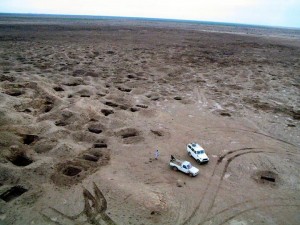 (Isin, Bau‘s patron city ruins, heavily looted)
(Isin, Bau‘s patron city ruins, heavily looted)
355-377 In Isin, Icbi-Erra became king; he ruled for 33 (ms. P5 has instead: 32) years.
Cu-ilicu, the son of Icbi-Erra, ruled for 20 (ms. P5 has instead: 10) (ms. Su1 has instead: 15) years.
Iddin-Dagan, the son of Cu-ilicu, ruled for 21 (ms. Su1 has instead: 25) years.
Icme-Dagan, the son of Iddin-Dagan, ruled for (mss. P2, P5 have:) 20 (ms. Mi has instead: 18) years.
Lipit-Ectar, the son of Icme-Dagan (ms. P2 has instead: Iddin-Dagan), ruled for (mss. L1+N1, P2, P5 have:) 11 years.
Ur-Ninurta (mss. L1+N1, P2 add:) , the son of Ickur (Adad) —
may he have years of abundance, a good reign, and a sweet life – ruled for (ms. P5 has:) 28 years.
Bur-Suen, the son of Ur-Ninurta, ruled for 21 years.
Lipit-Enlil, the son of Bur-Suen, ruled for 5 years.
Erra-imitti ruled for 8 (mss. P5, TL have instead: 7) years. (ms. P5 adds:) …… ruled for …… 6 months.
Enlil-bani ruled for 24 years.
Zambiya ruled for 3 years.
Iter-pica ruled for 4 years.
Ur-dul-kugaruled for 4 years.
Suen-magir ruled for 11 years.
(ms. P5 adds:) Damiq-ilicu, the son of Suen-magir, ruled for 23 years.
14 kings; they ruled for 203 years (ms. P5 has instead: 225 years and 6 months).
(Mss. P2+L2, L1+N1 and P4+Ha conclude with a summary of the post-diluvian dynasties; the translation of ll.
378-431 uses numerical data from each mss. but follows the wording of P2+L2 and L1+N1)
378-431A total of 39 kings ruled for 14409 + X years, 3 months and 3 1/2 days, 4 times in Kic (Kish).
A total of 22 kings ruled for 2610 + X years, 6 months and 15 days, 5 times in Unug (Uruk).
A total of 12 kings ruled for 396 years, 3 times in Urim (Ur).
A total of 3 kings ruled for 356 years, once in Awan.
A total of 1 king ruled for 420 years, once in Hamazi.
16 lines missing
A total of 12 (?) kings ruled for 197 (?) years, once in Agade (Akkad).
A total of 21 (ms. P4+Ha has instead: 23) kings ruled for 125 years and 40 days
(ms. P4+Ha has instead: 99 years), once in the army of Gutium.
A total of 11 (ms. P4+Ha has instead: 16) kings ruled for 159 (ms. P4+Ha has instead: 226) years, once in Isin.
There are 11 cities, cities in which the kingship was exercised.
A total of 134 (ms. P4+Ha has instead: 139) kings, who altogether ruled for 28,876 + X (ms. P4+Ha has instead: 3443 + X) 21 years.
